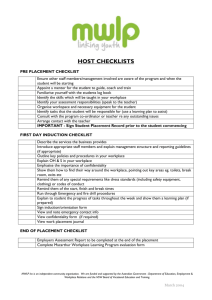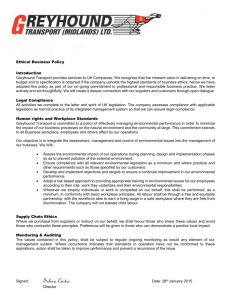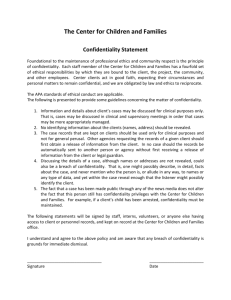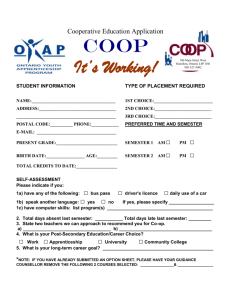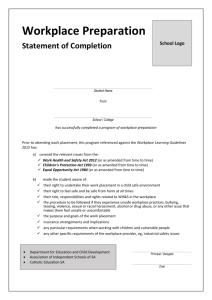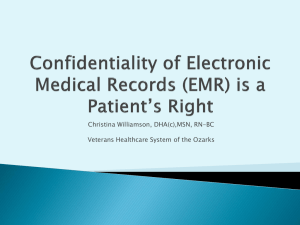Confidentiality and Workplace Ethics
advertisement
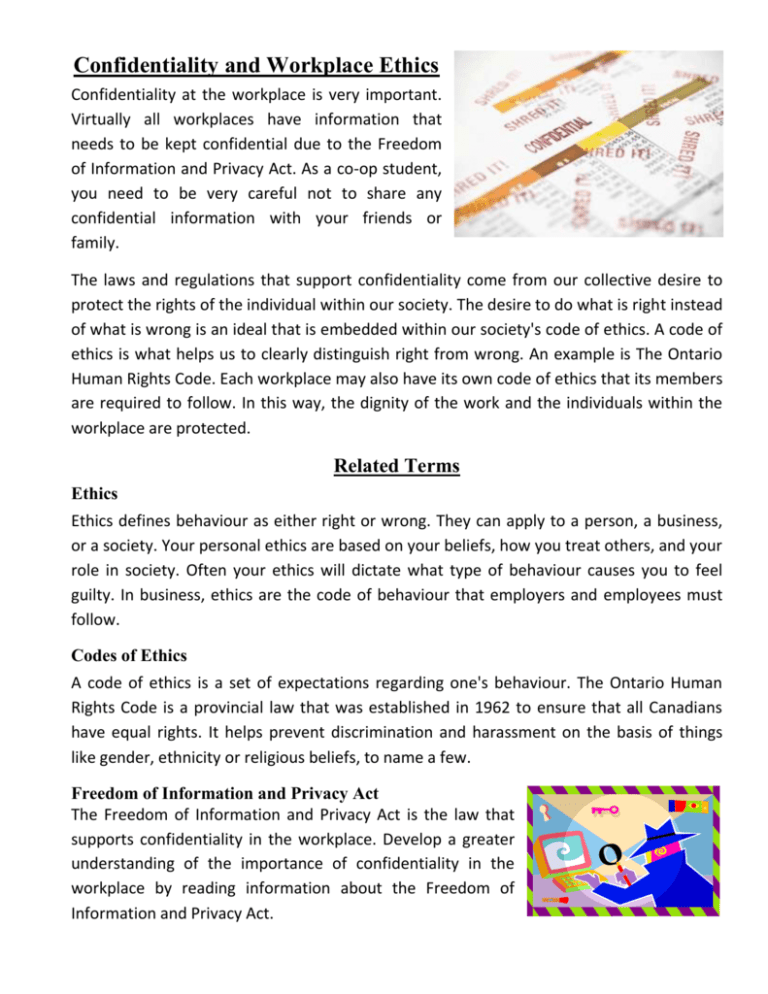
Confidentiality and Workplace Ethics Confidentiality at the workplace is very important. Virtually all workplaces have information that needs to be kept confidential due to the Freedom of Information and Privacy Act. As a co-op student, you need to be very careful not to share any confidential information with your friends or family. The laws and regulations that support confidentiality come from our collective desire to protect the rights of the individual within our society. The desire to do what is right instead of what is wrong is an ideal that is embedded within our society's code of ethics. A code of ethics is what helps us to clearly distinguish right from wrong. An example is The Ontario Human Rights Code. Each workplace may also have its own code of ethics that its members are required to follow. In this way, the dignity of the work and the individuals within the workplace are protected. Related Terms Ethics Ethics defines behaviour as either right or wrong. They can apply to a person, a business, or a society. Your personal ethics are based on your beliefs, how you treat others, and your role in society. Often your ethics will dictate what type of behaviour causes you to feel guilty. In business, ethics are the code of behaviour that employers and employees must follow. Codes of Ethics A code of ethics is a set of expectations regarding one's behaviour. The Ontario Human Rights Code is a provincial law that was established in 1962 to ensure that all Canadians have equal rights. It helps prevent discrimination and harassment on the basis of things like gender, ethnicity or religious beliefs, to name a few. Freedom of Information and Privacy Act The Freedom of Information and Privacy Act is the law that supports confidentiality in the workplace. Develop a greater understanding of the importance of confidentiality in the workplace by reading information about the Freedom of Information and Privacy Act. Responsible Use of Information Technology Depending on the type of placement you have, you may be exposed to various forms of technology. Three key forms of information technology are the Internet, email, and messenger chat programs like msn. While at a workplace, use of the Internet is restricted to visiting websites that are directly related to company business. At no time should you be using the Internet for personal use or visiting inappropriate websites while at your placement. Email is another form of information technology that is commonly used at a workplace. Email may be used to communicate with co-workers or with clients. The content of email messages should be strictly related to company business and never used to discuss your personal life. Messenger chat programs like MSN may be used to communicate with clients or coworkers. It is important that message content remains professional at all times. Confidentiality Confidentiality means that you will not discuss private information that you are exposed to at your co-op placement with others outside of the workplace. Both clients and co-workers have the right to expect that their personal information will remain confidential. You are strongly encouraged to ask your employer what aspects of your placement need to remain confidential. Many workplaces require employees to sign a confidentiality agreement. Your employer may or may not ask you to do the same. Do not “bad mouth” the business on the basis of behind the scenes knowledge which you are privileged to as an employee. You have a duty of loyalty to those who employ you and a duty to maintain the confidentiality of privileged information. Confidentiality and Workplace Ethics Read the following cases and respond to the questions in the space provided. Student Name: _____________________________ /15 Case Study # 1 Louise had her co-op placement at the Board of Education’s Computer Centre. She was learning to be a data-entry trainee. Louise was doing well at her placement and had received excellent evaluations from her supervisor. One day she was asked to assist in establishing a data bank that would include all teachers’ names, addresses, phone numbers, age, years of experience and salary level. The next day Louise told her English teacher she knew how old she was and how much money she earned. As a student, what do you think of Louise’s situation? How does this example breach confidentiality? Case Study # 2 Joe’s co-op placement is at the local bank branch as a teller trainee. When he started his placement, he was required to sign an oath of confidentiality. By signing his oath, he agreed that he would not reveal any information about customers’ accounts. One day, while working with the bank’s loan officer, he discovered that his next door neighbour owed a large amount of money to the bank and he had fallen behind in his payments. If he does not make a payment within days, the bank will repossess his house which had been put up as collateral for the large loan. A friend of Joe’s mother has been looking for a good buy on a house in their neighbourhood. This would be a great opportunity for Joe to help out his mother’s friend. What should he do? Why? Case Study # 3 Sandy’s co-op placement is in a medical laboratory. She assists the lab technician conducting pregnancy tests. Sandy discovered that one of the students in another class at her school is pregnant. Sandy rushed back to school and told her best friend. Eventually the story got back to the pregnant student and she is now in tears in the guidance office. If you were a co-op student (Sandy), what consequences would you expect as a result of this incident? Case Study # 4 An eighteen year old co-op student has now been at her placement for four weeks. During that time, the employer has made some advances that she is not comfortable with. She has refused his offers to get a ride home after work and she has been hurt by the employer’s rude remarks in front of other office staff. Her evaluations from him have been positive so far. What should she do? What role does the co-op teacher have in this situation? Case Study # 5 Ann Marie is a co-op student at a local daycare and she is really enjoying her work with the children. She has become extremely concerned though about one little girl who seems to have many unexplained cuts and bruises and who tends to be very fearful when approached by adults. Ann Marie is suspicious that the child is being mistreated at home. The child’s mother is a very good friend of the daycare supervisor. What should Anne Marie do?
